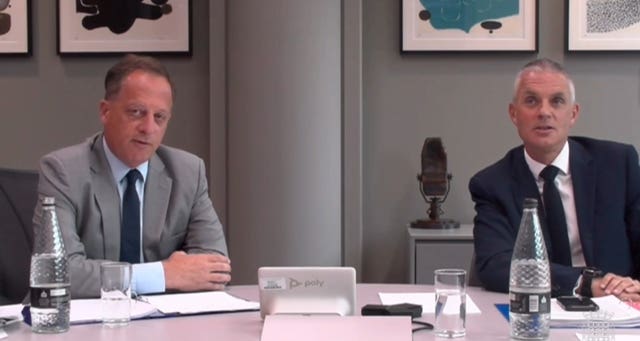Russia has banned dozens of UK journalists, including the heads of the BBC, Times and Guardian, from entering the country.
A statement published by its Ministry of Foreign Affairs said those included on the 29-strong list were “involved in the deliberate dissemination of false and one-sided information” about Russia and the war in Ukraine.
Another 20 figures who Moscow claim are linked to the defence industry were also sanctioned.
Among those on the list are BBC director-general Tim Davie, The Times’ editor John Witherow, The Guardian’s editor-in-chief Katharine Viner, editor-in-chief of the Daily Telegraph Chris Evans, and BBC chairman Richard Sharp.

BBC journalists Nick Robinson, Orla Guerin and Clive Myrie, who have all reported from the ground in Ukraine and its capital of Kyiv during the conflict, also feature, as do correspondents from ITV News and Channel 4 News.
Russia said the journalists and media representatives named had contributed towards “fuelling Russophobia in British society”.
A spokesperson for the BBC said: “We will continue to report independently and fairly.”
While a spokesperson for The Guardian said this is a “disappointing move” by the Russian government and a “bad day for press freedom”.
They added: “Trusted, accurate journalism is more important now than ever, and despite this decision we will continue to report robustly on Russia and on its invasion of Ukraine.”
Surprised probably doesn’t cover how I feel about being sanctioned/banned by a country I’ve only visited once.
— Emma Graham-Harrison (@_EmmaGH) June 14, 2022
Emma Graham-Harrison, who is among the sanctioned Guardian journalists, wrote on Twitter: “Surprised probably doesn’t cover how I feel about being sanctioned/banned by a country I’ve only visited once.”
Another reporter for The Guardian, Shaun Walker, added: “I wasn’t racing to visit Z-land Russia, but it is still a very strange/sad feeling to be put on their sanctions list along with other British colleagues.
“I lived in Russia for more than a decade and have been at least once every year since 2000.”
A Telegraph spokesperson said: “The Telegraph is proud of its reporting of the invasion of Ukraine and regrets attempts by Russia to restrict press freedom.”
Russia said those figures on the list who are connected to the UK defence industry had been involved in making decisions “on the supply of weapons to Ukraine, which are used by local punishers and Nazi formations to kill civilians and destroy civilian infrastructure”.
I have been banned from visiting Russia – which is a shame since I’ve always learned from my trips there and enjoyed them. I hope I can return to the country when it has a civilised government that no longer attacks its neighbours and murders its opponents
— Gideon Rachman (@gideonrachman) June 14, 2022
The chief foreign affairs commentator for the Financial Times, Gideon Rachman, who is on the list, said on Twitter: “I have been banned from visiting Russia – which is a shame since I’ve always learned from my trips there and enjoyed them.
“I hope I can return to the country when it has a civilised government that no longer attacks its neighbours and murders its opponents.”
The list also includes Britain’s navy chief and senior executives at defence and aerospace firms Thales UK and BAE Systems.
Moscow has seized on the far-right origins of one of the units in Ukraine, calling the Azov Regiment’s fighters “Nazis” and accusing, without evidence, their commander of committing atrocities during the war.
Last month, Foreign Secretary Liz Truss announced that Russian businesses were being cut off from the UK’s accountancy, management consultancy and PR sectors, as part of further sanctions against the country.




Comments: Our rules
We want our comments to be a lively and valuable part of our community - a place where readers can debate and engage with the most important local issues. The ability to comment on our stories is a privilege, not a right, however, and that privilege may be withdrawn if it is abused or misused.
Please report any comments that break our rules.
Read the rules here